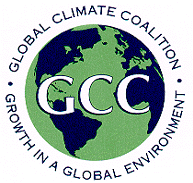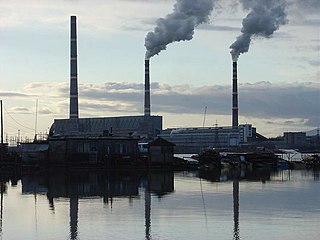Related Research Articles

The Global Climate Coalition (GCC) (1989–2001) was an international lobbyist group of businesses that opposed action to reduce greenhouse gas emissions and publicly challenged the science behind global warming. The GCC was the largest industry group active in climate policy and the most prominent industry advocate in international climate negotiations. The GCC was involved in opposition to the Kyoto Protocol, and played a role in blocking ratification by the United States. The coalition knew it could not deny the scientific consensus, but sought to sow doubt over the scientific consensus on climate change and create manufactured controversy. The GCC dissolved in 2001 after membership declined in the face of improved understanding of the role of greenhouse gases in climate change and of public criticism.

The Kyoto Protocol is an international treaty which extends the 1992 United Nations Framework Convention on Climate Change (UNFCCC) that commits state parties to reduce greenhouse gas emissions, based on the scientific consensus that (part one) global warming is occurring and (part two) it is extremely likely that human-made CO2 emissions have predominantly caused it. The Kyoto Protocol was adopted in Kyoto, Japan, on 11 December 1997 and entered into force on 16 February 2005. There are currently 192 parties (Canada withdrew from the protocol, effective December 2012) to the Protocol.
Emissions trading is a market-based approach to controlling pollution by providing economic incentives for reducing the emissions of pollutants.

A carbon tax is a tax levied on the carbon content of fuels, generally in the transport and energy sector. Carbon taxes are a form of carbon pricing. The term carbon tax is also used to refer to a carbon dioxide equivalent tax, the latter of which is quite similar but can be placed on any type of greenhouse gas or combination of greenhouse gases, emitted by any economic sector.
A carbon credit is a generic term for any tradable certificate or permit representing the right to emit one tonne of carbon dioxide or the equivalent amount of a different greenhouse gas (tCO2e).

An international environmental agreement or sometimes environmental protocol, is a type of treaty binding in international law, allowing them to reach an environmental goal. In other words, it is "an intergovernmental document intended as legally binding with a primary stated purpose of preventing or managing human impacts on natural resources."

The complex politics of global warming results from numerous cofactors arising from the global economy's dependence on carbon dioxide emitting fossil fuels; and because greenhouse gases such as CO
2, methane and N
2O cause global warming.
Business action on climate change includes a range of activities relating to global warming, and to influencing political decisions on global-warming-related regulation, such as the Kyoto Protocol. Major multinationals have played and to some extent continue to play a significant role in the politics of global warming, especially in the United States, through lobbying of government and funding of global warming deniers. Business also plays a key role in the mitigation of global warming, through decisions to invest in researching and implementing new energy technologies and energy efficiency measures.

Individual and political action on climate change can take many forms. Many actions aim to build social and political support to limit and reduce the concentration of greenhouse gases (GHGs) in the atmosphere, with the goal of mitigating climate change. Other actions seek to address the ethical and moral aspects of climate justice, especially with regard to the anticipated unequal impacts of climate change adaptation.
The Organisation Internationale des Constructeurs d'Automobiles, commonly abbreviated OICA, founded 1919 in Paris, is an international trade association whose members are 39 national automotive industry trade associations. OICA facilitates communication among its member national automotive industry trade associations and advocates for policies and position of mutual interest to its members at the international level and to the general public.

The Campaign against Climate Change is a UK-based pressure group that aims to raise public awareness of anthropogenic climate change through mobilising mass demonstrations. Founded in 2001 in response to President Bush's rejection of the Kyoto Protocol, the organization saw a steady increase in attendance on marches before a sudden take-off in interest between October - December 2005. An estimated 10,000 people attended a rally in London on 3 December 2005. The following year on 4 November 2006 the Campaign organised a march from the US Embassy to the iCount event in Trafalgar Square. At least 25,000 people gathered in Trafalgar Square that day making it easily the biggest demonstration on climate change in the UK to date, until The Wave march in December 2009.
The Investor Network on Climate Risk is a network of investors and financial institutions that promotes better understanding of the financial risks and investment opportunities posed by climate change. INCR is coordinated by Ceres, a coalition of investors and environmental groups working to advance sustainable prosperity.
Post-Kyoto negotiations refers to high level talks attempting to address global warming by limiting greenhouse gas emissions. Generally part of the United Nations Framework Convention on Climate Change (UNFCCC), these talks concern the period after the first "commitment period" of the Kyoto Protocol, which expired at the end of 2012. Negotiations have been mandated by the adoption of the Bali Road Map and Decision 1/CP.13.
The Forests Now Declaration is a declaration that advocates using carbon credits to protect tropical forests. The Declaration was created by the Global Canopy Programme, and has been signed by over 200 NGOs, business leaders, scientists and conservationists. The Declaration was created as carbon credits from land use, land-use change and forestry were omitted from the Clean Development Mechanism for the First Commitment Period of the Kyoto Protocol despite contributing 18-25% of all emissions.
Islands First is a non-governmental organization working on behalf of the Small Island Developing States to confront the challenges of climate change, the depletion of ocean resources, and ocean level's rise.
The Asia-Pacific Emissions Trading Forum (AETF) was an information service and business network dealing with domestic and international developments in emissions trading policy in Australia and the Asia-Pacific region. The AETF was originally called the Australasian Emissions Trading Forum, and was founded in 1998 under the auspices of the Sydney Futures Exchange following a proposal from Beck Consulting Services. From 2001 until 2011 the AETF published the AETF Review, held regular member meetings and convened numerous events and conferences. The AETF Review was published six times per year and included original articles on emissions trading developments and related topics.
Although it is a worldwide treaty, the Kyoto Protocol has received criticism.
In political ecology and environmental policy, climate governance is the diplomacy, mechanisms and response measures "aimed at steering social systems towards preventing, mitigating or adapting to the risks posed by climate change". A definitive interpretation is complicated by the wide range of political and social science traditions that are engaged in conceiving and analysing climate governance at different levels and across different arenas. In academia, climate governance has become the concern of geographers, anthropologists, economists and business studies scholars.

This article is about the economics of climate change mitigation. Mitigation of climate change involves actions that are designed to limit the amount of long-term global warming. Mitigation may be achieved through the reduction of greenhouse gas (GHG) emissions or through the enhancement of sinks that absorb GHGs, for example forests.

The Climate and Clean Air Coalition to Reduce Short-Lived Climate Pollutants (CCAC) was launched by the United Nations Environment Programme (UNEP) and six countries — Bangladesh, Canada, Ghana, Mexico, Sweden, and the United States — on 16 February 2012. The CCAC aims to catalyze rapid reductions in short-lived climate pollutants to protect human health, agriculture and the environment. To date, more than $47 million has been pledged to the Climate and Clean Air Coalition from Canada, Denmark, the European Commission, Germany, Japan, the Netherlands, Norway, Sweden, and the United States. The program is managed out of the United Nations Environmental Programme through a Secretariat in Paris, France.
References
- ↑ Iskander, Natasha N.; Lowe, Nichola (2020). "Climate Change and Work: Politics and Power". Annual Review of Political Science. 23: 111–131. doi: 10.1146/annurev-polisci-061418-095236 .
- ↑ Meckling, Jonas. "The Globalization of Carbon Trading: Transnational Business Coalitions in Climate Politics." Global Environmental Politics , Vol. 11 Issue 2 (May 2011):29-33
| This article about an international organization is a stub. You can help Wikipedia by expanding it. |